“A person who drinks too much on occasion is still the same as they were sober. An alcoholic, a real alcoholic, is not the same person at all. You cannot predict anything about them except they will become someone you never met before.”
-Raymond Chandler, The Long Goodbye
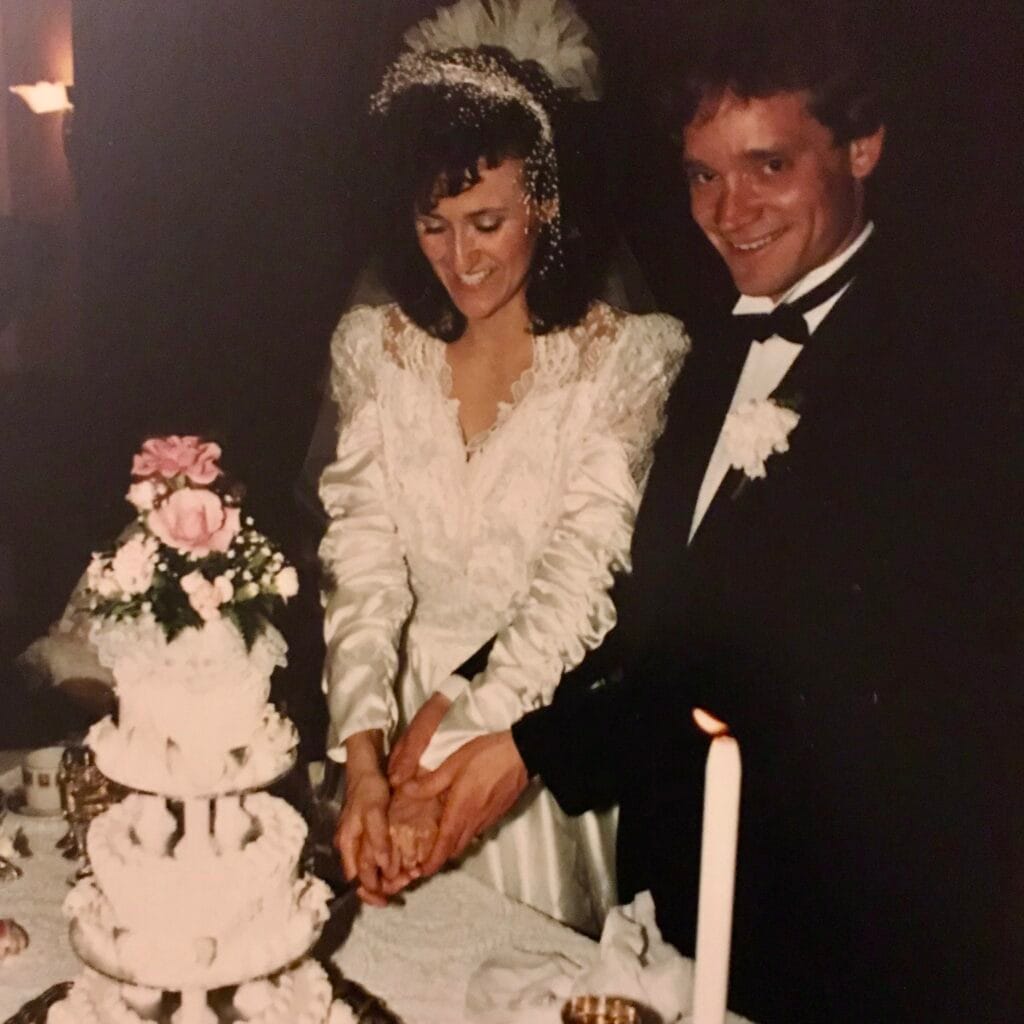
My wedding day, April 10, 1987
He was sweet, a little bit shy, and handsome, reminding me of my dad. I adored my alcoholic husband. I did not know he had a drinking problem when we met. We were in our early twenties then, and as young people, we all liked to party, having drinks on the weekend, listening to music, and hanging out with friends.
When I walked down the aisle to marry him, I suspected that he might overindulge from time to time. There were signs, but I loved him. All I wanted was a husband, a baby, and a home.
In a sense, my father walked me down the aisle as if he was unknowingly dropping me off to spend my life with a stranger, someone that I should be fending off rather than joining in wedded bliss. If I could have predicted the future, I might have chosen someone else. But in retrospect, it was best that I did not know what the future held.
I tried very hard to fix my husband throughout our marriage, to change him and make him into the man I wanted him to be. I cried, pleaded, and begged for him to quit drinking. I thought that once we were married, life would be different. If we had a baby, he might choose to curb his appetite for liquid libations. When that did not work, I hoped that another baby would do the trick.
Our two little girls became my joy, but I was struck with terrible sadness and disappointment within, which I carried underneath a radiant smile and motherly duties.
The grass always seemed greener on the other side of the fence. I continuously looked at other families and longed to be more like them.
I was young and had not yet learned that everyone had skeletons in their closets. Not one single person on earth is perfect, and most people have secrets that are kept under lock and key, certain hush-hush and veiled mysteries never divulged. Only those living under the same roof can see the realities of what lies within.
Some refer to alcohol addiction as the elephant in the room, a metaphorical idiom that refers to an enormous topic or controversial issue that everyone knows about. Still, no one mentions or discusses it because it makes them feel uncomfortable. Or perhaps it is personally and socially embarrassing, far too contentious to mention.
Unlike an elephant, alcohol was more like an evil force that invaded and engulfed my husband. Its claws dug in deep to his body and soul and would not let go. It seemed impossible for him to get free. Even though he tried, he could not eliminate the sinister force that stole him from our children and me. The addictive qualities tormented him, changed him until he was no longer the man I knew.
But before all of that, we moved into a log home my father had built. We upgraded it, and my new husband put in a beautiful flower garden.
It was not until years later, when everything had ended, that I found out he did his best drinking while gardening. The proof was in the empty whiskey bottles hidden amongst the geraniums and cherry tomato vines. Like land mines and time bombs, the empty liquor bottles appeared as shrapnel, jagged and pointy like thorns on a rose. Evil and good, pain and pleasure, nestled in the flower bed I had come to love.
As a gifted and avid gardener, he took great care of the lilac tree and the yellow rose bush that my father had planted for my mother way back when they were first married. My dad had died six months after we got married, so I treasured those plants—aromatic blossoms that brought memories of my dad back to life, along with memories of his love for my mother. My husband’s watchful attendance to these flowers from my past warmed me.
I asked for red geraniums and window boxes. So he built, planted, and nurtured them and helped them grow.
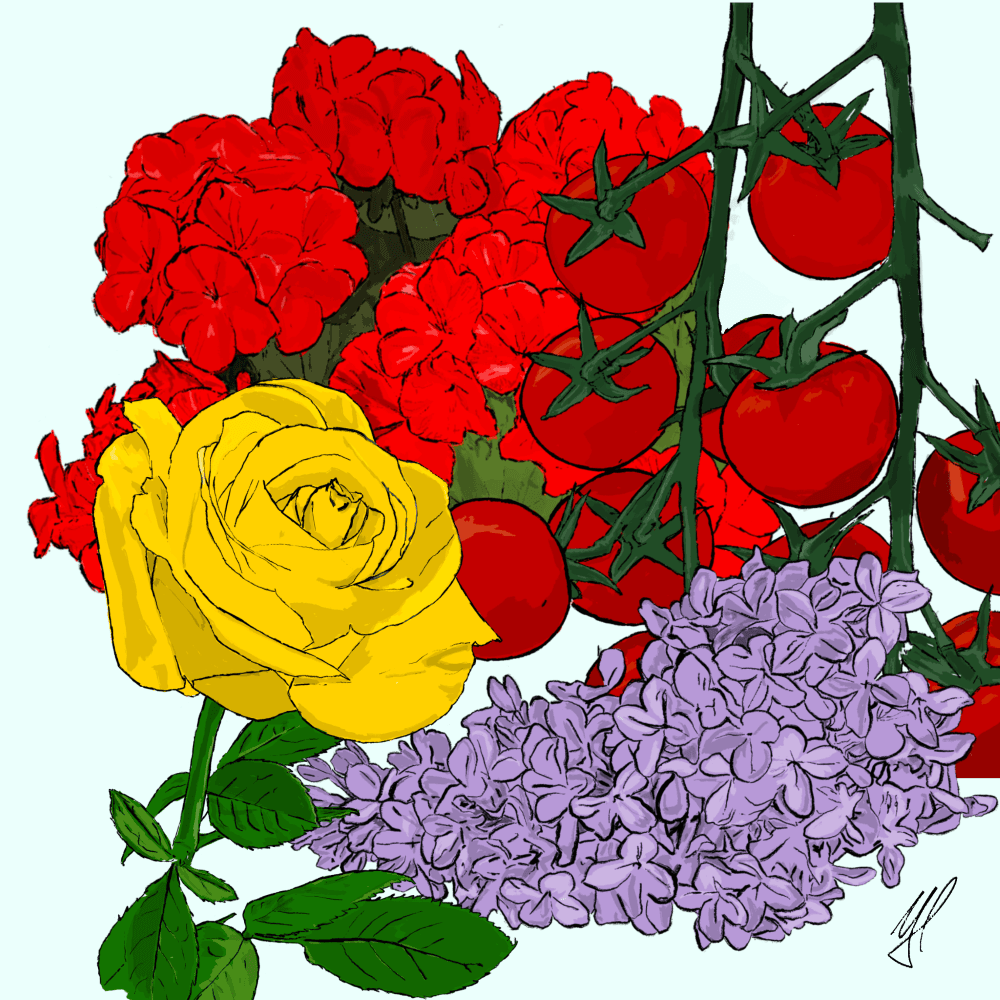
My red geraniums, dad’s yellow roses, mom’s lilacs and Dale’s tomatoes. Artwork by Mackenzie Harmon @sonofvincent
How relevant all his hiding was, almost like a rite of passage. People have been doing it for years and still practice the art of camouflage to this day—places to hide their guilt, shame, and problem drinking. His was the garden. Other people find cupboards, the garage, under beds and in drawers; golf bags, gym bags, and the toilet tank. The options are endless. Where there’s a will, there’s a way.
The lengths of the alcoholic’s desperation is heart wrenching. The very thing they are hiding and trying to protect us from is what rips us all apart. But, the best protection of all is stopping and getting help. Many try, some succeed and conquer, while others become conquered.
Our beautiful garden was a decoy for my husband’s addiction.
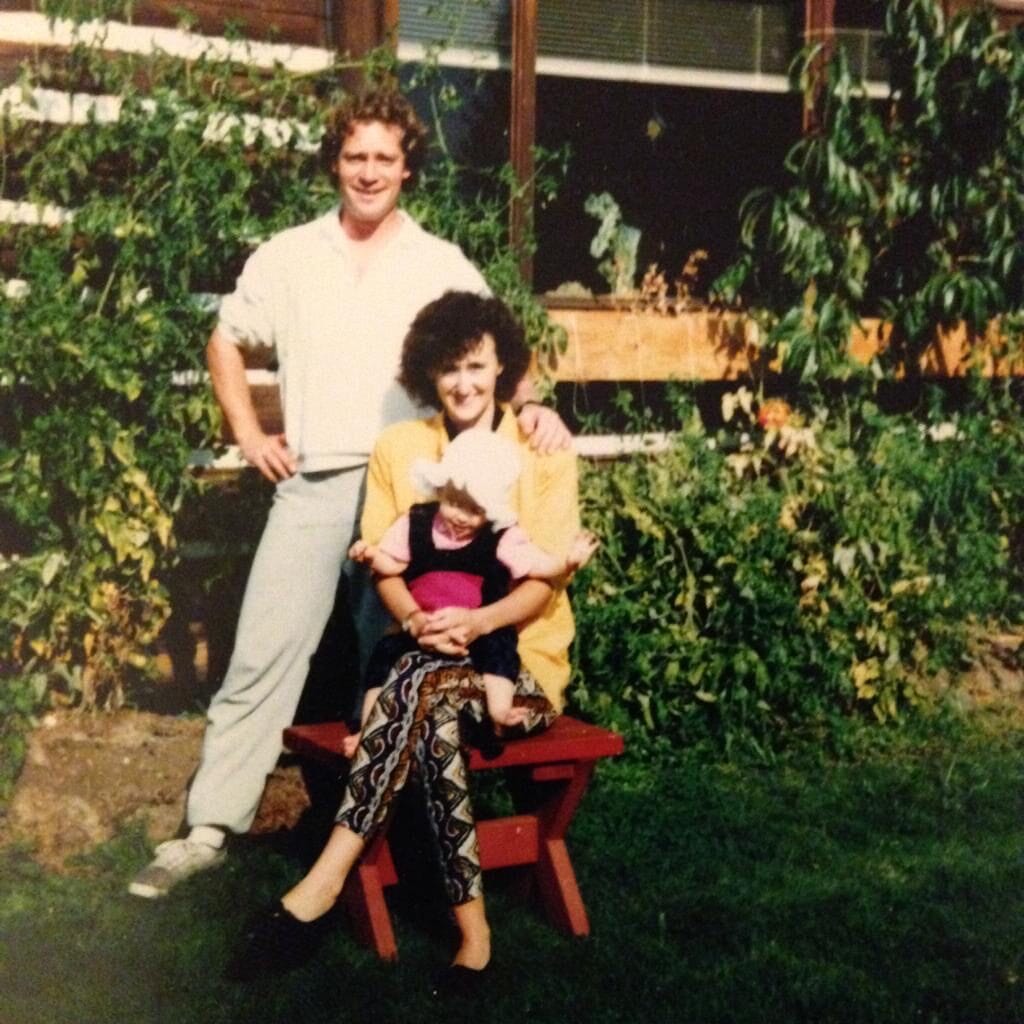
Family photo at the side of the house 1988
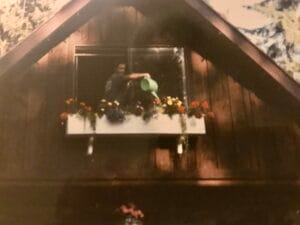
Dale watering my flowers
I left pamphlets around the house about alcoholics anonymous; brochures about treatment centers and magazine articles about the devastation alcohol abuse has on a family. I made appointments with doctors and therapists. I arranged an intervention with family and friends. I prayed and prayed until there were no more prayers left in me. And worst of all, I dished out ultimatums.
When none of my attempts to make him quit drinking worked, I tried the “If you can’t beat ‘em, join ‘em” mentality, thinking, how bad could it be? At least we would be on the same page, in the same headspace, but then I realized we could hardly afford HIS drinking let alone me jumping on the bandwagon. Besides, I did not have the stamina. Late-night drinking and hangovers were not a part of my original plan.
As a fitness instructor, I ate, drank, and breathed good health and fitness. On top of that, I was a mother, and with that came responsibilities and work to shape and mould our precious little people.
Throughout my whole life, I wanted to be a mother and a wife, which was not an easy feat, because in the 1980s, a liberated woman would never admit to this as a goal.
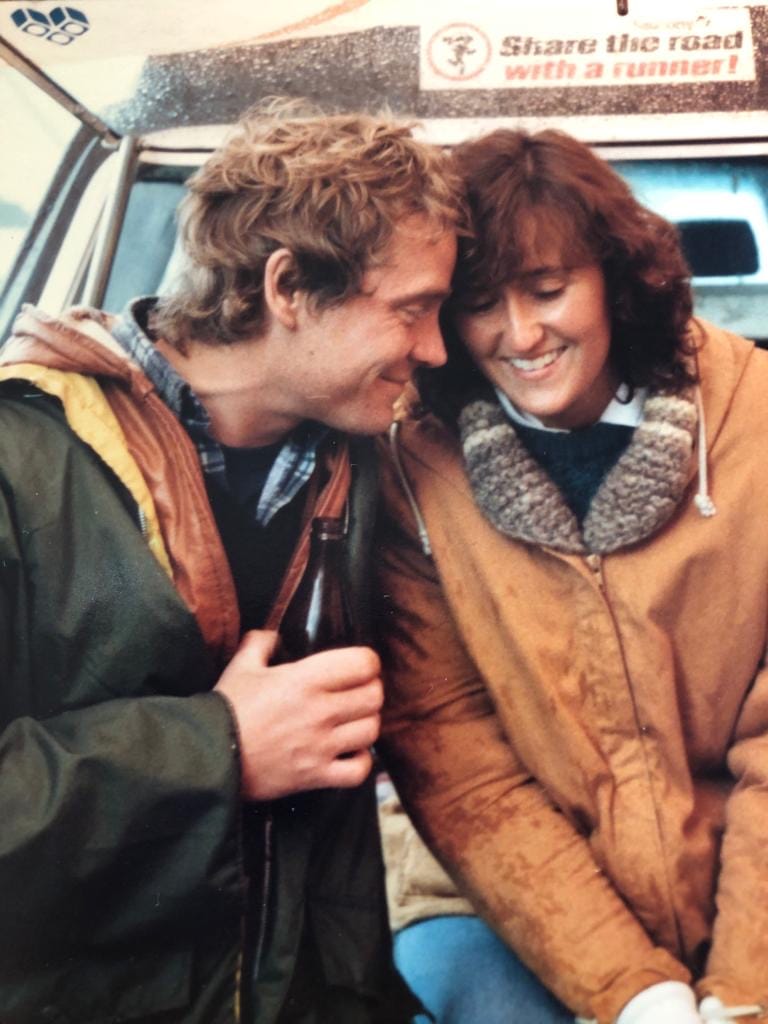
Crabbing in Sooke, 1986
I eventually cracked the code to my unhappiness. It was the most challenging work I have ever done. It took years of self-discovery, healing, and grieving. In the ‘90s we called it ‘Tough Love’, whereas some referred to it as looking out for number one. The best term and action that worked for me was setting up personal boundaries.
Setting up boundaries is a valuable life skill that helps define a person by outlining safe and permissible ways for people to behave. Having boundaries also helps us respond when someone passes those limits. It is not mean or hurtful to work towards clarity and ways to control incoming and outgoing interactions between people.
How did I know it was time?
I had been invited to an afternoon get together. You know, the kind where mothers gather with other mothers. Their children play out in the yard while the moms chat and share their thoughts on work, family, politics, news, fashion, favourite recipes and tv shows. We might have a potluck lunch or dinner, a few might have a glass of wine and then coffee and dessert at the end. Everyone parts ways and drives home clean and sober.
Before arriving at the party, I decided to take the hostess a bottle of wine as a gesture.
Pulling into the parking lot at the cold beer and wine store, my eldest daughter, four years old at the time, started crying. Not just tears but sobs and outright wailing. Before I could stop the car and figure out what was wrong, she said, “No, mommy, we can’t go here; this is where daddy goes.”
My heart instantly broke.
Their father, who did handsprings in the yard, backflips on the trampoline, and played the guitar for hours, often went to this very same liquor store while leaving our girls in the car. They were small, but their feelings were big and real. They knew.
Looking into the eyes of my daughter, I had to say something. She was inconsolable. So, I made it simple, yet I validated her distress and fear. I said, “If you were to eat ten chocolate bars at a time, it would probably make you very sick. Alcohol is the same. One drink periodically would not be so bad, but what if someone had five or even ten, one after the other? It would make them very sick. If they did it every day, then their body and mind would not work very well anymore”.
She accepted this. I did not go into the liquor store that day.
My life had been highjacked by his consumption of beer, Southern Comfort, and a few joints daily. I asked myself if I could get my daughters out from under the affliction that was killing their father and sabotaging our marriage. A little voice inside my head struggled to come out, but when it did, it said, “Yes, you can.”
Leading up to the day of my chocolate bar analogy, I had been going to AL anon meetings, reading self-help books, and going for individual counselling. I also found a group of women to cycle with, or rather, they found me. I looked for spirituality in a local church and had contemplated leaving my marriage, but it was the tears and distress of my little girl that shook me to attention and gave me the strength to go.
I was thirty-two and had worked at saving my relationship and primarily the man in it, for ten years. Most of us spouses and partners have learned that it is up to the individual to get help. I eventually realized that nothing I could say or do would make him quit drinking.
After leaving, I was proud that my daughters no longer overheard our arguments, experiencing my tears and their father’s silence.
My oldest daughter is now thirty-two, the same age I was when I chose to leave, which is not the solution for everyone. I do not profess to have all the answers. Should you stay, or should you go? Will they recover, or won’t they?
Alcoholism does not look the same for everyone. Some people may drink every day, while others only drink every three months. When drinking alcohol begins to interfere with our lives and relationships, it’s most likely an addiction.
People do not get out of bed in the morning intentionally wanting to hurt others. As children, we do not dream of one day growing up and becoming an addicted person. We are born. We are held and nurtured, or maybe we are not. Our needs are met, or perhaps they are not, and even so, something happens to us along the way. The once clean slate or empty canvas of our perfect state-of-the-art human self becomes imprinted with the language of our life experiences.
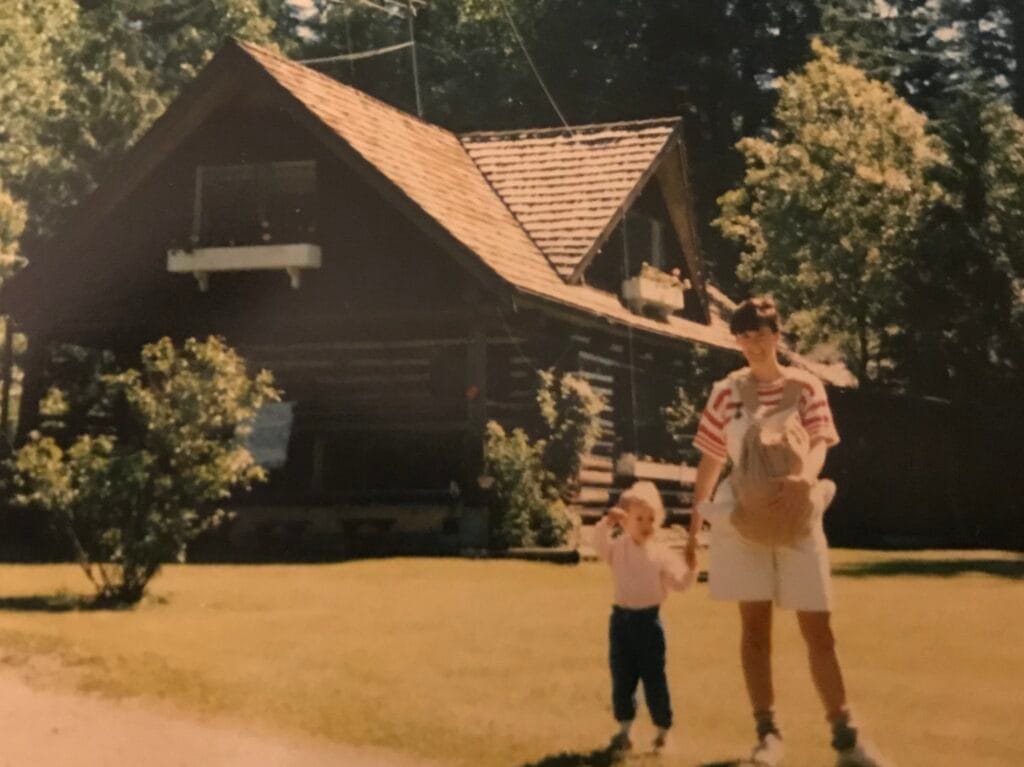
Standing in front of the log home, me and the girls, 1990
So, what happened?
Some of us had parents who raised us to the best of their ability, and their parents before them did the same. But they often lived their lives based on their environment, past hurts, and patterns, and sometimes too much meaning was put into the poisonous things.
I learned that I had no control over my alcoholic, and there was no way to stop him from drinking. My safety, mental and emotional health, and that of my children became my priority. Everything had become unmanageable. The disease is progressive, and my children needed one healthy and sober parent, and that was me.
There is no clear road map or a magical crystal ball that tells us why the people we love become addicted. Or why they cannot stop. As hard as this sounds, we need to take care of ourselves. We can still love them. I still love my ex-husband, my children’s first father. But for me, I had to let him go to save us.
I have been a special needs teaching assistant for twenty-eight years, a fitness instructor for forty years, and in the last two years, I have written and published two books. Looking for Normal and Where is My Happy Ending? – A Journey of No Regrets.
My journey has been one of no regrets. I permitted myself to think that way because here I am. My struggles and successes are what have made me who I am today.
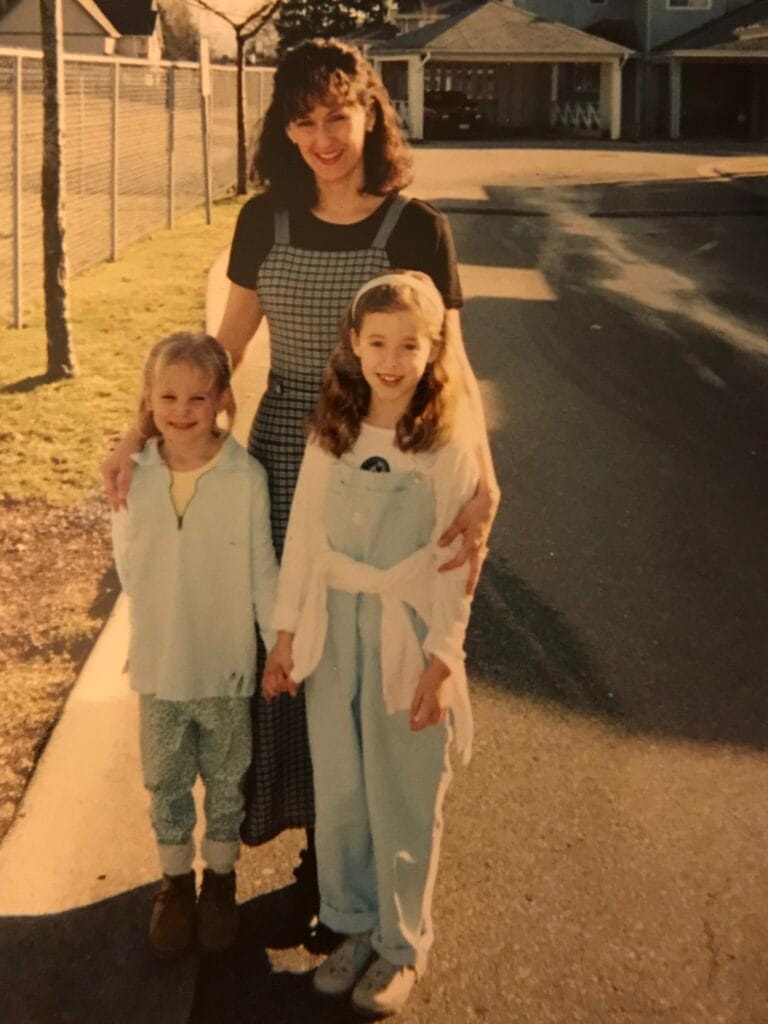
Emma, Karen and Jessica – Low-income housing 1993
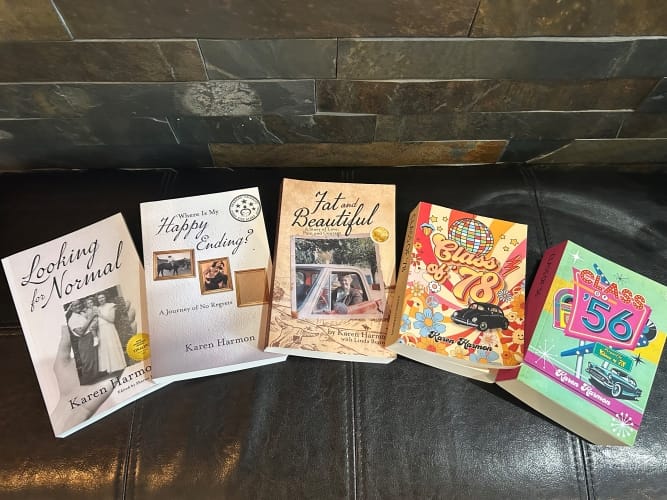
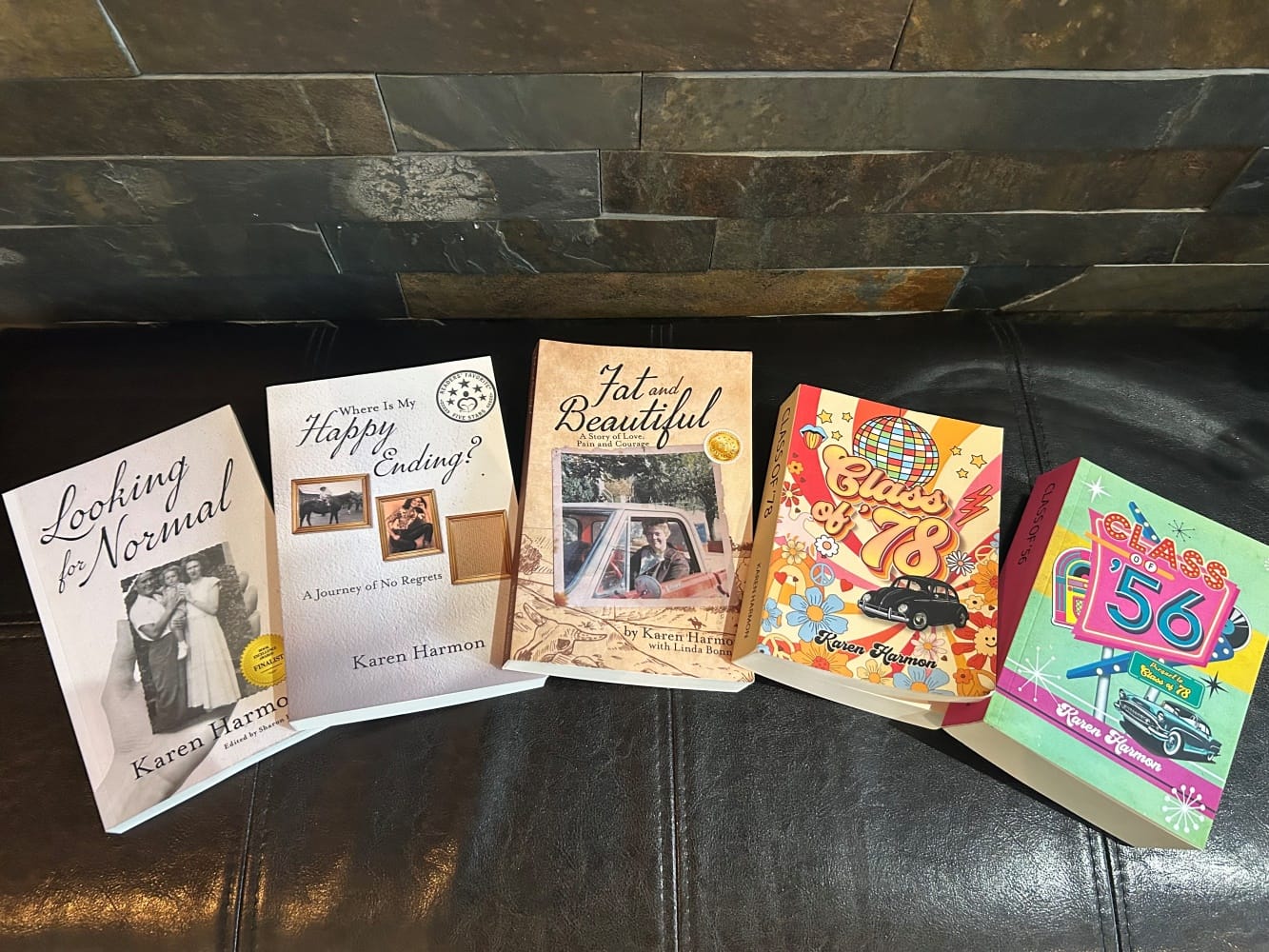
Thank you for sharing Karen. Your vulnerability, courage and strength is inspiring and your writing is superb. This will be very helpful for many people.
Thanks Nadine, I really appreciate your comments and support. I know you share my desire to help others through our writing. xo
Thanks for sharing by Karen. We’ve all been touched by addiction in one way or another.
It sure seems that way, thanks for your comment Diane xo
Karen
This is a beautifully written article about finding love, following dreams and feeling the heartbreak of living and loving a person with an addiction. Your journey of survival fueled by your little girls’ love is a testament to the beautiful inner strength you have to be the very best you can be for yourself and your girls. Thank you for sharing.
I am so glad I can speak about my past openly and honestly. It truly has helped me grow and live my life with no regrets. Your words of encouragement mean a lot. Thank you!
Karen: Very well written. So sad how Addiction can take a beautiful marriage and family and destroy what you worked so hard to hold onto. Proud of the decision you made years ago to take the girls out of the toxic situation. It took courage, strength and heartbreak to make the decision you made. You have raised to beautiful girls. And I believe it has made you into the strong independent women you are today! Thank-you for opening up about addiction.
Thank you Lee-Ann, Once I began focussing on my own healing, I was able to see more clearly. I appreciate your kind words. Thanks again so much.
That was beautiful Karen! Alcoholism is a terrible disease that steals so many lives. It stole my first marriage and, like you, it was my son who gave me the motivation to finally leave. It’s amazing how love makes us stay, hoping that love will fix what is broken and then realization comes that we have to care for those who are the most vulnerable. A very difficult and challenging thing to be a single mom. Kudos to you for your love and courage.
Lori, your comments are proof that sharing brings closeness and unity. I love that we share a similar story. And kudos to you too. We did it. We made it.
That was a well written “life experience“
Because that’s what it is
Alcoholism is a chronic disease which means there is no cure & yes is a sickness
I know this because I too am alcoholic & although sober almost 20 years am still an alcoholic
As mentioned no cure but unlike other incurable diseases a way fir it to go in remission is abstinence
Unfortunately a very small percentage of people get this gift and like for husband die a sad , horrible & painful death
Of course it doesn’t end there because there are all the family, friends (victims) now must live in the sadness and wonder -what could I have done better (so sad 😢) because honestly it was out of your control from the get go
The only hands it’s in is the alcoholic
And trust me this disease is cunning ,baffling & powerful
Honestly if he was never destined to get sober he’s in a better place
That may be harsh but the torment of being an active alcoholic is truly hell on earth
Karen you are a wonderful beautiful person with a heart of gold
It show by you writing this blog with the pure idea to help others
Your a blessing
Always remember he had a heart, loved you , his children and I’m sure it broke his heart on a daily basis that he couldn’t be the man you 3 ladies needed ❤️❤️❤️❤️
Thank you for your sincere and honest comments. I really appreciate and admire you. Your story and how far you have come has inspired so many and will continue to do so. I often thought as mad as I was at him; he was much madder at himself. I know he truly loved us, and we loved him.
Thank you Karen.
A real story and a hard road. I grew up with an alcoholic parent so I know how the person you love is there somewhere but so hidden in the addiction they are hard to see. Healing is not an overnight job, it takes years, I know this.
You are someone to be proud of and I hope you are of yourself and the children you saved from that situation. I met you in the mid 90’s and had no idea of your struggles. What a strong woman you are.
Hi Karen, it is wonderful to hear from you! Thank you so much for commenting. I love how you referred to “the person being so hidden in the addiction they are hard to see” that makes so much sense.